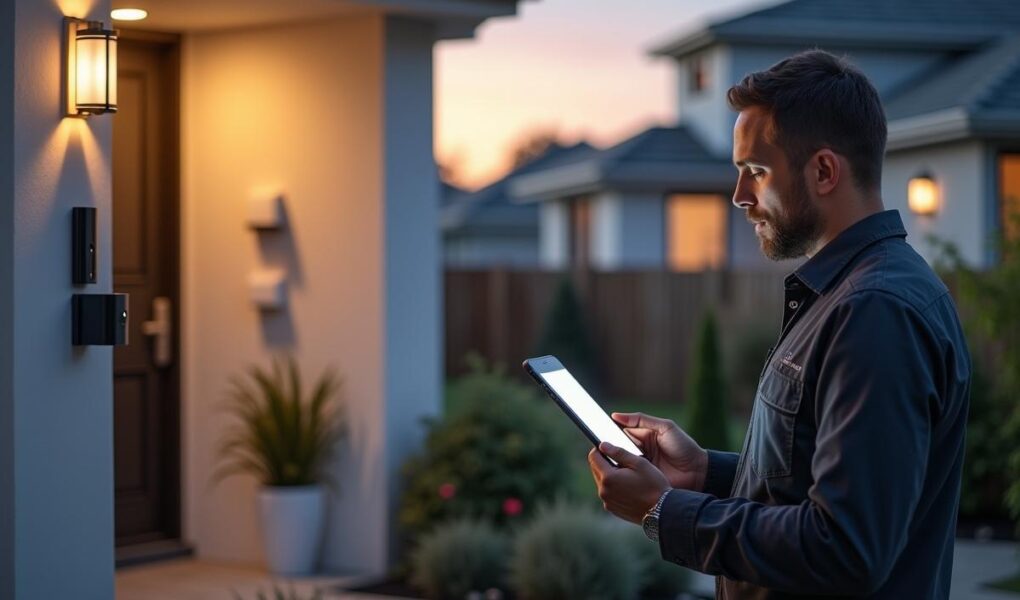Choosing the right provider for home security is essential in today’s safety-conscious world. We all want to protect our families, our valuables, and the place we call home. Yet, the sheer number of companies offering similar packages can make your head spin. Everyone promises the best technology, swift emergency responses, and a worry-free experience.
It can be hard to see through the marketing noise and identify what truly matters for long-term security needs. Some people focus on equipment quality, while others care deeply about professional monitoring options. There’s also a growing demand for smart home integrations that keep everything connected through phones or tablets. When you approach this decision thoughtfully, you reduce the odds of wasted money or unneeded stress.
Why It Matters to Evaluate Different Options
Many homeowners leap into choosing the first provider they see advertised, but that can lead to missed features or inflated costs. By weighing different contract lengths, device options, and overall reliability, you ensure your system fits your exact needs. After all, it’s not just about attaching a camera to your front door or waving around the latest gadget. It’s about knowing you can rely on your security setup in times of crisis.
Examining various companies also helps you see how each one addresses potential risks. Some excel at specialized alarm monitoring for fires or floods, while others focus heavily on intrusion detection. Even pricing can vary based on equipment brands, warranty periods, and service fees. The more you explore, the more likely you’ll end up with a solution that truly feels right for your home.
Equipment and Installation Approach
Before signing any contract, look at the types of devices a company offers. Some providers use only their own branded products, while others partner with trusted third-party manufacturers. This difference can impact everything from performance to warranty coverage. Focus on whether devices come with features like infrared night vision, two-way audio, or motion detection that suits your property’s layout.
When it comes to actual installation, consider whether you’d prefer professional help or a DIY approach. Professional installation often ensures everything is set up properly, down to the last sensor. On the other hand, some people enjoy the flexibility of installing systems on their own. Make sure to ask about any extra fees if professional installation is required, and confirm if the system is easy to expand later on.
The Value of Professional Monitoring
It’s worth exploring how a prospective company handles emergencies and alerts. Some rely on self-monitoring, which means notifications go directly to your phone or email. If you miss that alert because you’re busy, urgent situations can escalate. That’s why many homeowners opt for professional monitoring, where a dedicated team keeps an eye on sensors and cameras around the clock.
Professional monitoring services vary, so check whether a provider has a dedicated call center operating 24/7. You’ll also want to see how quickly they contact emergency services. A fast response time might be the difference between preventing a major incident and dealing with a big headache. If you like the idea of self-monitoring, ask if you can switch between plans without penalties. It’s comforting to have that freedom as life and schedules change.
Alarm Monitoring Vs. Self-Monitoring
Several providers let you choose between fully monitored and self-monitored packages. With self-monitoring, you’ll often pay less each month, but it places the burden on you to handle urgent alerts. If you’re certain you won’t miss an important push notification, that might work. But if there’s a chance you’ll be traveling or unreachable, investing in a professional watch is often safer.
Keep in mind that alarm monitoring isn’t just about intruders. Some plans include sensors for carbon monoxide, fire, or flooding. That means you can get timely help if your basement floods while you’re on vacation. A comprehensive approach to monitoring can save you thousands in potential damages.
Considering Smart Home Integrations
Technology has reshaped how we interact with our homes, and security is no exception. Many modern systems offer clever integrations that let you control everything through a single app or hub. It could be as simple as turning on lights when a camera detects motion at night, or as elaborate as locking every door the moment you activate the alarm.
Smart home compatibility also extends to voice command features with popular virtual assistants. Imagine checking the status of your alarm system right from your phone or adjusting indoor cameras through voice prompts. When evaluating providers, see if they partner with well-known smart home brands. This ensures you won’t get stuck with outdated software or limited connectivity in the future.
Choosing the Right Add-Ons
Even when you find a solid base package, don’t forget about add-ons. Some homeowners prefer doorbell cameras with two-way audio, while others want indoor sensors with temperature readers for child or pet safety. There are also advanced options like glass-break detectors, garage door sensors, and panic buttons.
Ask whether you can add new devices at any time, or if changes must be done within a specific window of your contract. Flexibility matters it lets you adapt your setup if your lifestyle changes, such as bringing home a new pet or welcoming a baby. A great home security provider will provide a range of simple ways to expand your system without hassle.
Reading Contracts and Warranties Carefully
It might feel a bit dull, but looking at the fine print can save you from headaches later on. Some contracts lock you in for multiple years, with high fees to cancel early. Others might only have month-to-month plans, which can be more flexible if things change. Make sure you know exactly what any cancellation policy entails, so you don’t get stuck paying for services you no longer need.
Warranty coverage also varies significantly. Certain companies back their equipment for as long as you remain a customer, while others might have a one-year limit. Knowing this before committing can give you peace of mind if something malfunctions after a couple of years. If a provider has a strong reputation for device quality, that might be worth a slightly higher price tag.
Hidden Fees to Watch Out For
Sometimes, providers advertise very low monthly rates, and then tack on extra charges for essential features. If you see a suspiciously cheap plan, dig deeper. You could face separate charges for installing cameras, maintaining backup batteries, or using advanced mobile app features.
When signing up, request a list of potential fees and confirm if they’re one-time or recurring. That way, you won’t face surprises when your bill arrives. Being proactive with questions can help you sidestep frustration, especially if a provider expects you to foot additional costs for repairs or technical support.
Importance of Checking Reviews and Reputation
Reviews can offer a glimpse into a provider’s actual performance. You’ll find honest thoughts about their response times, how well systems function, and how issues get resolved. Take note of patterns if multiple people mention the same drawback, there’s likely truth to it. Similarly, a flood of positive comments about quality customer support might mean this company genuinely cares.
Beyond online feedback, it can be helpful to ask neighbors, friends, or family who’ve invested in a security system. Their firsthand experiences might give you insights you won’t find on a corporate website. Small local providers can sometimes offer more personalized help, while bigger names have broader coverage. Weigh all this feedback carefully as you narrow down your choices.
Monitoring Social Media Engagement
Stick your nose in a company’s social media pages. This might seem casual, but it can reveal how promptly they address questions or complaints. A company that actively responds and offers quick solutions is more likely to be responsive during real emergencies.
Social platforms can also hint at any hidden fees, special deals, or new product launches. Keep an eye on discussions or groups in your community people often share successes and frustrations there, giving you extra context before committing.
Comparing Costs Without Sacrificing Quality
Cost plays a big role, but never sacrifice essential features for a budget plan that won’t truly protect your home. Analyze how monthly or annual fees match up with the services offered. Spending a little more on reliable equipment and professional monitoring can spare you unexpected costs later on. Crisp video footage, quick emergency notifications, and accurate sensors often justify a slightly higher price.
Try to get a few quotes from different companies this is a significant investment, and you want to feel good about where your money is going. If a provider is far above or below the average price you’ve found, take an extra moment to check why. Sometimes that extra cost reflects better customer service or more comprehensive monitoring. Other times, it might just be inflated rates tied to fancy branding.
Negotiating and Special Promotions
Don’t be afraid to politely mention a competitor’s pricing or promotional deals if you see a big difference. Companies often have retention offers or seasonal discounts that aren’t heavily advertised. This conversation can help you land a fair deal while making sure you’re getting top-notch protection.
Still, approach negotiations with realistic expectations. Larger providers might not budge much on monthly costs but could throw in free equipment upgrades, free installation, or extra sensors. Smaller local companies might be more open to tailoring a deal if you agree to a longer contract. Know your priorities, and aim for the arrangement that feels right for your security goals.
Final Thoughts
Getting this decision right can mean years of comfort and peace of mind. Spending time on research, comparing offers, and reading reviews is worthwhile when the end result is top-tier safety. Seeking a provider with solid monitoring, transparent fees, and reliable gear can make all the difference. Once everything is in place, you can rest easier knowing your home is protected with a system built to respond at a moment’s notice.




